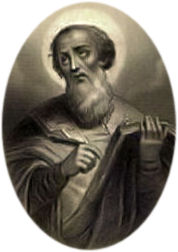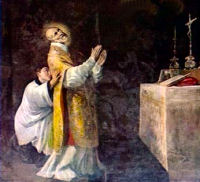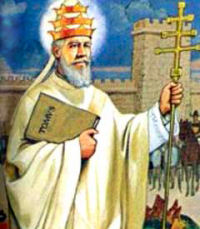Subscribe for free today!
Get newsletters with the latest content, and access to exclusive ebooks and podcast episodes.
Already subscribed? Log in to stop seeing invitations to subscribe.
Ordinary Time: November 10th
Memorial of St. Leo the Great, pope and doctor
Other Commemorations: St. Andrew Avellino, Priest (RM)
» Enjoy our Liturgical Seasons series of e-books!
Today the Church celebrates the memorial of St. Leo the Great, pope and doctor, during whose pontificate the Council of Chalcedon (451) defined that Christ is one divine person with two natures, divine and human. It was a confirmation of his Epistola Dogmatica (Tomus) to the Patriarch Flavian of Constantinople. He vigorously defended the unity of the Church. He detained the onrush of the barbarians under Attila. His feastday in the Extraordinary Rite is April 11.
According to the 1962 Missal of Bl. John XXIII the Extraordinary Form of the Roman Rite, today is the feast of St. Andrew Avellino who was born in Sicily and died at Naples. As a cleric he went to Naples to study law, and was meanwhile raised to the priestly dignity. Today is also the commemoration of Sts. Tryphon, Respicius and Nympha. Tryphon, a Phrygian, was martyred with his companion Respicius at Nicaea (c.250). Nympha was a virgin of Palermo, martyred in the fourth century.
St. Leo the Great
 Leo I, Pope and Doctor of the Church, ruled from 440 to 461. He is surnamed "the Great" and ranks among the most illustrious sovereigns that ever sat on the throne of St. Peter. Of his life, we know little; with him the man seems to disappear before the Pope. He saw most clearly that one of his greatest tasks was to vindicate the primacy of the Roman bishop, St. Peter's successor, and to raise the prestige of the Holy See before the entire world. Hardly any Pope in history has occupied a like position in the ecclesiastical and political world.
Leo I, Pope and Doctor of the Church, ruled from 440 to 461. He is surnamed "the Great" and ranks among the most illustrious sovereigns that ever sat on the throne of St. Peter. Of his life, we know little; with him the man seems to disappear before the Pope. He saw most clearly that one of his greatest tasks was to vindicate the primacy of the Roman bishop, St. Peter's successor, and to raise the prestige of the Holy See before the entire world. Hardly any Pope in history has occupied a like position in the ecclesiastical and political world.
As a writer, too, his name is famous. His sermons, which occur frequently in the Divine Office, belong to the finest and most profound in patristic literature. The Council of Chalcedon was held under his direction (451). The Breviary tells us: Leo I, an Etruscan, ruled the Church at the time when Attila, King of the Huns, who was called the Scourge of God, invaded Italy. After a siege of three years, he took, sacked and burned Aquileia, and then hurried on toward Rome. Inflamed with anger, his troops were already preparing to cross the Po, at the point where it is joined by the Mincio.
Here Attila was stopped by Leo (452). With God-given eloquence, the Pope persuaded him to turn back, and when the Hun was asked by his servants why, contrary to custom, he had so meekly yielded to the entreaties of a Roman bishop, he answered that he had been alarmed by a figure dressed like a priest that stood at Leo's side; this individual was holding a drawn sword and acted as if he would kill him if he advanced farther. As a result Attila retreated to Pannonia.
Meanwhile, Leo returned to Rome, and was received with universal rejoicing. Some time later, the Vandal Genseric entered the city, and again Leo, by the power of his eloquence and the authority of his holy life, persuaded him to desist from atrocity and slaughter (455). Leo was also active in matters liturgical. The so-called Leonine sacramentary, a compendium of Missal prayers, contains many of his compositions; some liturgists give him credit for the beautiful offices of Advent.
—Excerpted from The Church's Year of Grace, Pius Parsch
Symbols and Representation: Image of the Virgin; pick-axe; model of St. Maria Maggiore; horse; Attila kneeling
Highlights and Things to Do:
- St. Leo's tomb is in St. Peter's Basilica in the Chapel of the Madonna of Partorienti.
- Listen to the Catholic Culture podcasts:
- Way of the Fathers: 2.5 Chalcedon: Firm Foundation for the Doctrine of Christ by Mike Aquilina
- Way of the Fathers: 48—Leo the Great: Who Roared with the Voice of Peter by Mike Aquilina
- Audiobooks: Pope St. Leo the Great—Three Lenten Sermons
- Audiobooks: Pope St. Leo the Great—Tome of Leo
- Find out more about St. Leo:
- Learn more about the Nestorian heresy and the Council of Chalcedon.
- Read Pope St. John XXIII's Encyclical on St. Leo.
- See Catholic Culture's Fathers of the Church collection for more writings of St. Leo.
- The name Leo means "lion," so a cake in the shape of a lion would be an appropriate name-day dessert. See also Catholic Cuisine for other ideas.
- See St. Leo's statue on St. Peter Basilica's Colonnade.
St. Andrew Avellino
 Lancellotto Avellino, the future Sant'Andrea, was born in Castronuovo, in Potentino in 1521. As a young priest he served at an ecclesiastical court. While making a defense, a small lie slipped by his lips; soon afterward he accidentally read the words, "A lying mouth kills the soul" (Wis. 1:11). Deeply moved, he resigned his position and dedicated himself solely to the service of God and the welfare of souls. In 1566 he entered the Order of Theatines and chose the name Andrew out of love for the Cross of Christ. He was master of novices for ten years, from 1560 to 1570. He labored most zealously as a shepherd of souls. With fatherly love and prudence he spent countless hours hearing confessions. Subsequently he worked between Milan and Piacenza at the houses of the Teatini in the two centers to preach the saving message of the Gospel.
Lancellotto Avellino, the future Sant'Andrea, was born in Castronuovo, in Potentino in 1521. As a young priest he served at an ecclesiastical court. While making a defense, a small lie slipped by his lips; soon afterward he accidentally read the words, "A lying mouth kills the soul" (Wis. 1:11). Deeply moved, he resigned his position and dedicated himself solely to the service of God and the welfare of souls. In 1566 he entered the Order of Theatines and chose the name Andrew out of love for the Cross of Christ. He was master of novices for ten years, from 1560 to 1570. He labored most zealously as a shepherd of souls. With fatherly love and prudence he spent countless hours hearing confessions. Subsequently he worked between Milan and Piacenza at the houses of the Teatini in the two centers to preach the saving message of the Gospel.
He died celebrating Mass on November 10, 1608.
By means of miracles God Himself often glorified the love of neighbor burning in the heart of His holy priest. Once as he was returning home from a round of duties, the rain and wind extinguished the lantern he was carrying. He and his companion, however, were not soaked by the downpour. In fact, rays of light proceeded from his body and guided them through the dense darkness. Many came to him to settle cases of conscience, his letters number thousands. Worn out by work and enfeebled by age, he suffered a stroke at the foot of the altar just as he was beginning holy Mass and died as he repeated for the third time, "I will go unto the altar of God." He is venerated as patron against sudden death.
—Excerpted from The Church's Year of Grace, Pius Parsch
Patronage: Against sudden death; apoplectic; apoplexy; for a holy death; Naples, Sicily; stroke victims; strokes
Highlights and Things to Do:
- What is our attitude on speaking the truth? Think about the seriousness of lying and examine your conscience about your attitude toward the truth. The words, "A lying mouth kills the soul," might well resound in our ears all through the day. And in what condition is my love toward Christ and His Cross? Would I choose the name Andrew out of love for the Cross? What a beautiful death—to die at the altar! Pray for an equally happy death, with the comfort of the last sacraments.
- Read more about St. Andrew: Catholic Encyclopedia
- CatholicSaints.info for further information.






